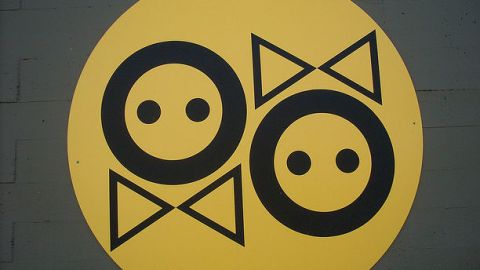The “Opposite Sex” or the “Other Sex”

A small annoyance that’s more consequential than it sounds: In the same-sex marriage debate, heterosexual, male-female couples are regularly described by judges, pundits, and advocates alike as “opposite sex” couples.
It’s common rhetoric. It also reinforces an injurious but ingrained view of gender relations, identity, and sex difference. The “opposite” sex implies that males and females are pitted against each other on opposing sides of consciousness and life. Among other rhetorical injuries, the term overstates the difference between them and elides their shared, overlapping humanity. It also conjures atmospherically the “battle between the sexes,” even implacable hostility, and calls to mind the puerile “women/venus; men/mars” reduction of identity into two diametrically distinct teams.
Opposite sex conveys more opposition and difference than exists. The “other sex,” in contrast, is a phrase that implies difference with complementarity, and spaces of shared humanity. Hypothetically, the “other sex” could even accommodate the existence of more than two diametric camps. It conveys a biological difference, without the rhetorical mood of imagining one sex pitted against the other.
We could refer to a male-female marriage as a heterosexual marriage, too, which is more accurate than opposite-sex marriage, in any case, since it provides a cleaner rhetorical counterpoint in the debate at hand, which is really about marriage equality for people with a different sexual orientation, and who identify themselves by that orientation.
Opposite sex as opposed to the other sex also implies a fixed duality. You have male, and female, and by the logic of opposites, there are only two places you can be. Biologically I suppose that’s accurate enough, although some would object even to this duality, as we learn more about the genetic and hormonal complexities of sex difference, and probe more deeply even into these seemingly obvious biological categories.
Don’t get me started on references to “opposite-gender” couples, which offend my ears with two misnomers for the price of one. At some point, I guess, it became indelicate to talk about sex in the sense of, male or female, XX or XY. So sex difference got PC-euphemized into the importantly wrongheaded term, gender. Gender actually means cultural elaborations of sex difference—not male and female, but masculinity and femininity.
Perniciously, the substitution of the word sex with gender undercuts the revolutionary insight and structural brilliance of the entire distinction. Using gender to mean sex, or using the two interchangeably, collapses once again male/masculine and female/feminine—the very distinction that feminists did such a good job of teasing apart.
I bet it’s the same sincere but misguided PC delicacy that leads to the question, “Are you a Vietnam Era Veteran” on job applications. Why, yes, anyone who lived in the 1960s or early 1970s is a veteran of the “era,” but probably not of the war. I suppose it’s indecorous to talk openly about the military personnel who fought in Vietnam, but I’m unsure why. It seems a fairly accurate description of what happened to them, best named rather than folded into the more sanitized, nebulous term, Vietnam era.
I’m sure Vietnam vets feel like they were in a war, not an era.
The next time someone asks me my gender I’m going to proudly say, “masculine,” if I can get up the courage to do it.




